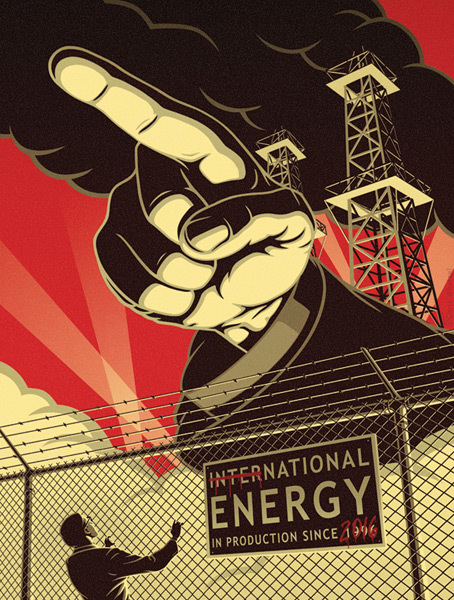The domination of Anglo Saxon liberal-capitalism has remained unopposed since the end of the Cold War. Being that this system was in place at the time of the fall of the Soviet Union, it was perceived that there was no other viable alternative that a society could prosper under. However, I contend that the narrative of America winning the Cold War was due to championing liberal capital and thus is the ultimate economic system, is a myth. It is often forgotten that the prevailing brand of US capital was economic-nationalism, which existed from the Founding Fathers until the late 20th Century.[1]
Its design was to strengthen national sovereignty, independence and prioritize domestic commerce.[2] These were achieved by supporting state control over economic enterprises and allocate employment to members of the nation.[3] There was also investment of the infrastructure, publishing houses, newspapers and libraries which would culturally, socially and economic support and protect national independence.[4] Unsurprisingly, the economic-nationalist Republican Party carried the White House from 1860-1932. [5]
It was only until the late 20th century that US neoliberalism began to rise. It was basically a repudiation of it own economic system, as under the context of fighting communism, any form of government intervention was deemed to be socialistic.[6] It advocated free-trade laissez faire economics: eliminating protectionism, supporting deregulation, reform corporate governance, liberalize finance, open labour markets, cut welfare and lower taxation.[7] This philosophy finally found success in transforming the status quo with the Reagan Revolution and remained in place when the ‘End of History’ was declared.[8] With Anglo-Saxon liberal capitalism triumphant, Margret Thatcher declared the TINA principal[9], and was later institutionalized by the ‘Washington Consensus’.[10]Despite the success of US capital, weaker states have found neoliberalism constraining and sought to champion another form of capitalism.[11] Being that socialism was discredited, I contend that nations that reject neoliberal commerce are seeking a non-socialistic alternative, which ironically appears to be economic-nationalism.
For instance, weakened from reunification, Germany opted for a mixed economy. This indicated that although capitalism was the economic model for a modern-nation, states are institutionally constructed in ways that produce different ‘rules of the game’.[12] Germany fostered cooperative relationships between firms, labour and banks with the state openly intervening to create a framework for the private and public sectors.[13] It balanced competition and coordination relations between government and industry, financial institutions and manufactures and labour and management.[14]
Moreover, China has transformed itself from Maoism into advocating State Capitalism. Inspired by Japan and South Korea, state-ownership was disregarded for indirect control and influence.[15] China now implemented decentralization with localism supporting the private sector with the national government implementing a ‘hands-off’ policy.[16] And now former privately classified businesses dependant on local government for financial help and private business were allowed to exist alongside state enterprises.[17] The success of Chinese capitalism now offers an international alternative to the Washington Consensus, entitled the ‘Beijing Consensus’. This advocated slow reform, state capital, exports led industrialization, modernization, defence of national interests, upholding the self-determination of other nations and avoiding interfering with sovereign states.[18]
In conclusion, US capitalism is not monolithic, as America once supported economic-nationalism for the majority of its existence. Furthermore, other nations have proven they can not only survive but also thrive within a globalized world while supporting an alternative capitalist system.
Bibliography
Breslin, S. (2012), “Government-Industry Relations in China: A Review of the Art of the State”, in Andrew Walter and Xiaoke Zhang eds., East Asian Capitalism: Diversity, Continuity and Change, Oxford: Oxford University Press.
Buchanan, P. (1998) The Great Betrayal, Little, Brown and Company, United Kingdom
Fukuyama, F. (1992) End of History, Free Press, United States
Mikler J. (2012), “Still Stalled on the Road to Neoliberal Globalisation? The Endurance of National Varieties of Capitalism,” in Stillwell, F., Cahill, D., and Edwards’ L. eds., Neoliberalism: Beyond the Free Market, Cheltenham, UK; Northampton, MA: Edward Elgar.
Szporluk, R (1988) Communism & Nationalism: Karl Marx versus Friedrich List, Oxford University Press, United States
Vogel, S. (2001), “The Crisis of German and Japanese Capitalism: Stalled on the Road to the Liberal Market Model?”, Comparative Political Studies, Vol.34, No.10, pp.1103-1133.
Zhang J, J (2011) Seeking the Beijing Consensus in Asia: An Empirical Test of Soft Power, Department of Political Science, Duke University, United States
[1] Pat Buchanan, The Great Betrayal, (Little, Brown and Company, 1998), p.114
[2] Pat Buchanan, The Great Betrayal, (Little, Brown and Company, 1998), p.288
[3] Robert Szporluk, Communism & Nationalism: Karl Marx versus Friedrich List, (Oxford University Press, 1988), p. 143
[4] Robert Szporluk, Communism & Nationalism: Karl Marx versus Friedrich List, (Oxford University Press, 1988), p. 144
[5] Pat Buchanan, The Great Betrayal, (Little, Brown and Company, 1998), p.253
[6] Pat Buchanan, The Great Betrayal, (Little, Brown and Company, 1998), p.294
[7] Steven Vogel, (2001) The Crisis of German and Japanese Capitalism, Comparative Political Studies, Vol.34, No.10, p.104.
[8] Francis Fukuyama, The End of History, (Free Press), p. 234
[9] There Is No Alternative
[10] John Mikler, (2012) Still Stalled on the Road to Neoliberal Globalization, Edward Elgar, p. 131
[11] John Mikler, (2012) Still Stalled on the Road to Neoliberal Globalization, Edward Elgar, p. 131
[12] John Mikler, (2012) Still Stalled on the Road to Neoliberal Globalization, Edward Elgar, p. 135
[13] Steven Vogel, (2001) The Crisis of German and Japanese Capitalism, Comparative Political Studies, Vol.34, No.10, p.105.
[14] Steven Vogel, (2001) The Crisis of German and Japanese Capitalism, Comparative Political Studies, Vol.34, No.10, p.104.
[15] Shawn Breslin, (2012) Government-Industry Relations in China, Oxford University Press, p. 10.
[16] Shawn Breslin, (2012) Government-Industry Relations in China, Oxford University Press, p. 13.
[17] Shawn Breslin, (2012) Government-Industry Relations in China, Oxford University Press, p. 12.
[18] Jiakun Jack Zhang, (2011) Seeking the Beijing Consensus in Asia, University p.11-12.

